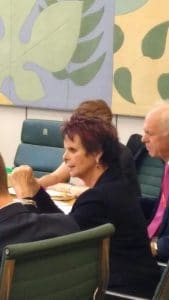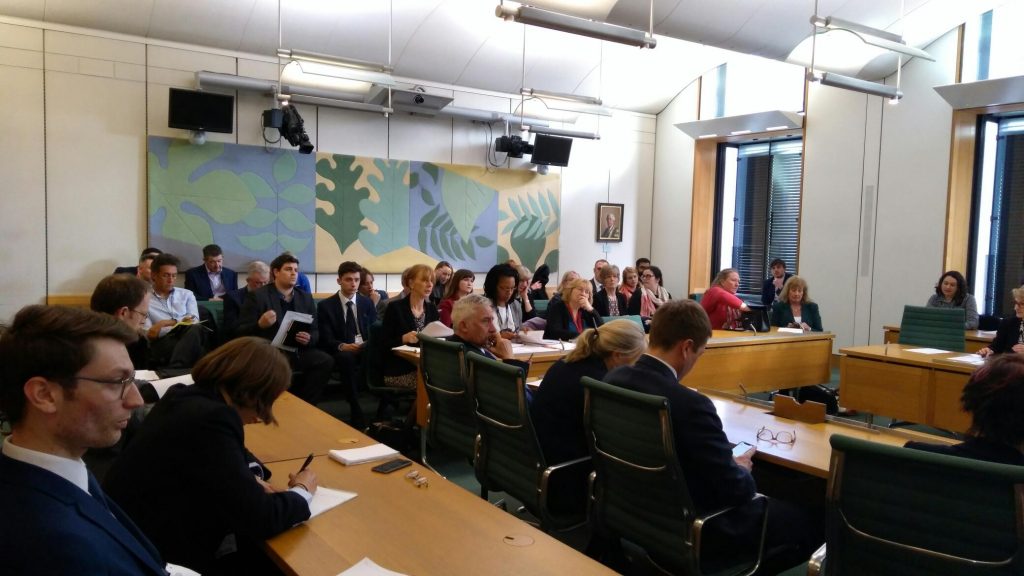On Monday 26th March, the All-Party Parliamentary Group for Education hosted the Minister of State for Apprenticeships and Skills, Anne Milton MP, who presented an overview of her work at the Department for Education, including a summary of the 2017 Careers Strategy.

Nic Dakin MP, co-chair of the APPG, opened the floor, and introduced the Minister. Milton began by giving an impassioned defence of the importance of good careers advice and gave a brief background on the recently published Careers Strategy.
She argued that the poor quality of careers education, information, advice and guidance (CEIAG) has been ‘one of the biggest failures’ of successive governments. She highlighted that some schools still use internal staff members who are not qualified as professional careers advisers – to provide careers guidance or fail to provide guidance of a high enough quality.
She then said that the Careers Strategy, which sets out plans and ambitions to transform careers advice and guidance in England, was three years in the making and represents an opportunity to finally get CEIAG right. Echoing the APPG for Education’s inquiry into how well our schools are preparing young people for their future which focused on young people’s readiness for the workforce, Milton said that the Strategy reflects the importance of skills development given demographic shifts and technological advances including the ascent of artificial intelligence technologies.
She ran through the main headlines from the document. The Gatsby Foundation’s eight Benchmarks will be adopted in full and ‘run through the spine’ of the Strategy. Schools will be obliged to publish the name and contact details of their Careers Leader on their website. The government will provide funding for the development of new training programmes and will support 500 schools to train their own Careers Leaders.
The government will pilot careers activities in primary schools and will work to examine new approaches to employer engagement and early careers activities in primary schools. Milton said that a new website for the National Careers Service will be developed including an improved and interactive course directory that will explain routes to vocational and academic learning opportunities while Skills Advisory Panels will analyse local skills needs to help shape school careers provision.
Schools must give providers of technical education and apprenticeships the opportunity to speak to pupils and schools should offer every young person at least seven encounters with employers during their education, with at least one ‘meaningful interaction’ with business every year. According to Milton, this sends an ‘important signal’ that these educational pathways represent aspirational routes to fulfilling careers, while the emphasis on technical and employment-focused education is beneficial to adults looking to skill and reskill in an increasingly flexible labour market.
Milton highlighted the challenge of parent attitudes as a major influence in children’s career development and decision-making. However, she suggested that the Strategy will act as a blueprint to challenge perceptions and break the cycle of low expectations and aspirations. The Strategy will bring together the education, business, and public sectors and emphasise that the purpose of school is to prepare young people for a successful future. Finally, she spoke of the important role MPs should play in promoting good CEIAG in schools across England, for example, through school visits and engagement with local communities.
Nic Dakin then opened the floor to questions.

In response to a question from Lord Storey on the process of teachers becoming qualified careers advisors, Milton said that the training of careers advisors was an important issue and that we need individuals with the right skillset. She argued that this emphasises the importance of young people obtaining meaningful interactions with employers to broaden their understanding of employment.
Dennis Hayes, Professor of Education at the University of Derby, asked whether going to Oxbridge or Russell Group universities should be encouraged as the highest aspiration for young people and warned of the danger of overemphasising skills at the expense of knowledge. Milton said that such a view could embed failure within the education system given the inability of large sections of the population to be admitted to such universities. She said that the consensus among employers is that formal knowledge is no longer enough to prepare young people for the workforce.
Responding to a question from Tracy Brabin MP on how to ensure young people are made aware of job opportunities that are not within their geographical area, Milton emphasised the importance of outreach employer engagement. Responding to a question from Peter Finegold of the Institution of Mechanical Engineers on the possibility of teachers taking placements in industry, Milton agreed that such placements would enable teachers to experience alternative paths and opportunities and increase their knowledge of industry and broaden their network of contacts.
This was followed by a question from James Frith MP on the inability of ‘meaningful encounters’ to replace human interaction with quality careers guidance professionals. Milton agreed that human interaction is central and re-emphasised the importance of careers activities in primary schools. Responding to Lord Watson’s question on whether schools should be allocated an ‘outstanding’ rating from Ofsted if the coverage of CEIAG is not outstanding, Milton said that schools should seriously consider whether they are succeeding if they fail to provide quality CEIAG.
In response to a question from Cara Bleiman, Mandarin Primary Specialist Teacher & SLE for the Harris Federation, on whether the Strategy is short-termist in outlook, Milton highlighted the Strategy’s recognition of the changing nature of work, with higher numbers of people in more flexible, atypical jobs and more self-employment, longer working lives, and the impact of technology, all of which emphasise the importance of flexible skills within the workforce. Finally, responding to a question from Jenny Connick of Talentino on the attention given to children with special educational needs and disabilities, Milton admitted that this was challenging but would work to ensure CEIAG for these individuals will be aspirational, personalised and well-informed.
Nic thanked the speaker and the attendees. The meeting was concluded with a formal EGM in which Emma Hardy MP was voted in as co-chair of the APPG for Education and Nic returned as vice-chair. Andrea Jenkyns remains as co-chair and Lord Storey remains vice-chair. The Group members in attendance for the EGM were: Nic Dakin MP, Emma Hardy MP, James Frith MP, Tracy Brabin MP, Lord Storey and Lord Watson.
